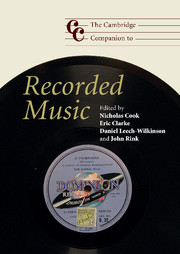Book contents
- Frontmatter
- Introduction
- Learning to live with recording
- A short take in praise of long takes
- 1 Performing for (and against) the microphone
- Producing a credible vocal
- ‘It could have happened’: The evolution of music construction
- 2 Recording practices and the role of the producer
- Still small voices
- Broadening horizons: ‘Performance’ in the studio
- 3 Getting sounds: The art of sound engineering
- Limitations and creativity in recording and performance
- Records and recordings in post-punk England, 1978–80
- 4 The politics of the recording studio: A case study from South Africa
- From Lanza to Lassus
- 5 From wind-up to iPod: Techno-cultures of listening
- A matter of circumstance: On experiencing recordings
- 6 Selling sounds: Recordings and the record business
- Revisiting concert life in the mid-century: The survival of acetate discs
- 7 The development of recording technologies
- Raiders of the lost archive
- The original cast recording of West Side Story
- 8 The recorded document: Interpretation and discography
- One man's approach to remastering
- Technology, the studio, music
- Reminder: A recording is not a performance
- 9 Methods for analysing recordings
- 10 Recordings and histories of performance style
- Recreating history: A clarinettist's retrospective
- 11 Going critical: Writing about recordings
- Something in the air
- Afterword: Recording: From reproduction to representation to remediation
- Notes
- Bibliography
- Discography
- Index
10 - Recordings and histories of performance style
Published online by Cambridge University Press: 28 September 2011
- Frontmatter
- Introduction
- Learning to live with recording
- A short take in praise of long takes
- 1 Performing for (and against) the microphone
- Producing a credible vocal
- ‘It could have happened’: The evolution of music construction
- 2 Recording practices and the role of the producer
- Still small voices
- Broadening horizons: ‘Performance’ in the studio
- 3 Getting sounds: The art of sound engineering
- Limitations and creativity in recording and performance
- Records and recordings in post-punk England, 1978–80
- 4 The politics of the recording studio: A case study from South Africa
- From Lanza to Lassus
- 5 From wind-up to iPod: Techno-cultures of listening
- A matter of circumstance: On experiencing recordings
- 6 Selling sounds: Recordings and the record business
- Revisiting concert life in the mid-century: The survival of acetate discs
- 7 The development of recording technologies
- Raiders of the lost archive
- The original cast recording of West Side Story
- 8 The recorded document: Interpretation and discography
- One man's approach to remastering
- Technology, the studio, music
- Reminder: A recording is not a performance
- 9 Methods for analysing recordings
- 10 Recordings and histories of performance style
- Recreating history: A clarinettist's retrospective
- 11 Going critical: Writing about recordings
- Something in the air
- Afterword: Recording: From reproduction to representation to remediation
- Notes
- Bibliography
- Discography
- Index
Summary
Introduction
Recordings show us that music we think we know intimately sounded quite different in the past. When music sounds different it is different, because music's meaning depends to a very important extent on its sound. Even if you sit at home and read an orchestral score (let's assume you have exceptional powers of musical imagination), the sounds you imagine are those made by a modern orchestra playing as orchestras play today. So however you hear it, there's no experiencing music except through the way it's performed: when the performance changes, the music changes. I think we have to assume, therefore, that pieces we believe we know rather well actually felt different a hundred years ago. We can get some sense of this by reading what people thought about pieces then. Scott Messing's studies of Schubert reception give some idea of how views of him and his music have changed. I've argued in another study that we can hear these changes also in recorded performance, indeed, that in some cases it was recordings of powerful performances (those of Dietrich Fischer-Dieskau especially) that shaped the things people thought and wrote about the composer, bringing to him a new seriousness and psychological depth that was not there in earlier commentary or – it would seem – for earlier listeners.
- Type
- Chapter
- Information
- The Cambridge Companion to Recorded Music , pp. 246 - 262Publisher: Cambridge University PressPrint publication year: 2009
- 18
- Cited by



